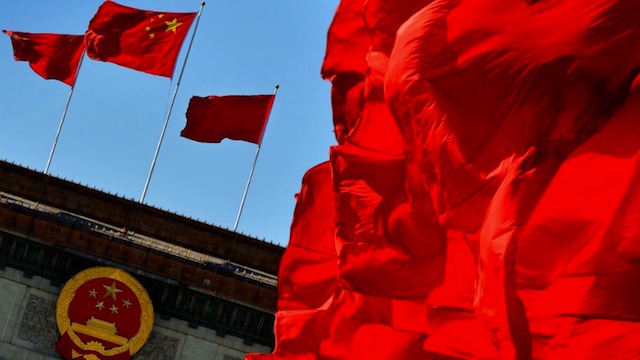SUMMARY
This is AI generated summarization, which may have errors. For context, always refer to the full article.
 Using purely liberal economistic measures, China has taken 650 million people out of poverty and became the second largest economy in only 30 years.Their renaissance represents 60% of the world’s poverty alleviation efforts during this time. This is a record that no other country using democratic capitalism has achieved in both poverty alleviation and growth.
Using purely liberal economistic measures, China has taken 650 million people out of poverty and became the second largest economy in only 30 years.Their renaissance represents 60% of the world’s poverty alleviation efforts during this time. This is a record that no other country using democratic capitalism has achieved in both poverty alleviation and growth.
Intuitively, these achievements increase China’s prospects of becoming the first non-western and “non-developed” most dominant country in the modern era making everyone look to the “Beijing Consensus.”
Chinese development has been widely understood as having “liberal economics with illiberal politics.” Many argue that China never had “liberal economics” and this author shares this view. If there is one thing scholars agree on, it is that China has a “non-liberal” politics. Joshua Ramo’s “Beijing Consensus” is an interest more so because China’s political configuration – as an “authoritarian” state – has achieved development, and democracies like the Philippines have not. The authoritarian tagline is of course derogatively applied but Dr. Francis Fukuyama would rather call it “responsive authoritarianism.”
It is hard to appreciate “non-democracy” if the unique cultural underpinnings in Asian societies are ignored. In China, as with many East Asian regimes like Japan or South Korea, the difference lies in the profound regard for collectivism, a deep respect for hierarchy, authority and obedience rather than individualism or opposition. When transplanted into a state-society context, in the West, the state is considered as an unwelcome invader while in China and in many parts of Asia, the state largely is, as Martin Jacques put it, “a part of the family.”
The challenge for defending non-democracy is diminished if we consider the success of the Chinese Communist Party in bringing about development. Why has the Chinese Communist Party brought about development? And why have democratic capitalist states not been able to do that? The burden of evidence and theoretical defense immediately shifts to those who defend the supplementary relationship between democracy and development.
Is China the big bad wolf?

Ironically, while the United States is democratic domestically, it seems like it is undemocratic outside. To add to the irony, China is seen to democratize US-led post-war “liberal” institutions while it is “non-democratic” domestically. The debate on whether China will be a “revisionist state” is far from over, but there are signs that it may actually be one.
The great strides of the consolidation of democratic governance in the 20th and 21st centuries especially culminating at the “end” of the Cold War, is seen as being undermined in developing countries. Its aid, loans and investments without any ideological prescriptions, make China a viable commercial and political partner.
Given the choice between aid from the United States and elsewhere that attaches conditions, countries would rather obtain these from sources which do not force them to abandon their Westphalian sovereignty. Increasingly so, developing countries that have deep-seated colonial memories are now looking at China rather than the United States for aid and growth.
Huge amounts of money from various Chinese state-owned and sponsored firms like the China Development Bank, the Industrial and Commercial Bank of China (ICBC; now the biggest state owned corporation in the world in 2013 outperforming Exxon Mobil according to Forbes) and other entities particularly Chinese energy firms like the China National Offshore Oil Corporation (CNOOC) and the China National Petroleum Corporation (CNPC), are being poured in developing countries notably in Africa.
China’s efforts to monetarily aid these countries without any ideological prescriptions for a certain brand of democracy or capitalism increase its “soft power” in these countries.
The US’ democratic capitalism which ideates and insists by force that its model is universal pales in comparison to China’s proclamation that its model cannot be exported and that it respects the self-determination of states. This belief in endogenous development enhances plurality in international political life. This places China at the forefront of reforming Western-led modernity and globalization today.
The more that China does this, the more that it will democratize the political conduct of international development. Despite its behaviour in territorial disputes with the Philippines and Japan and its meager aid in the wake of the destructive typhoon Haiyan that hit parts of the Philippines, this “other side” of China – its “peaceful development” and “peaceful rise” – and especially being pitted against the US record in the late 20th century represents a sharp challenge to the existing world order.
A useful way to understand this rhetoric on international politics is the distinction between China’s view of “centrality” and the western view of “universality.”
China’s sees itself in the center of the world and will not welcome invaders unless it “pays tribute.” This inward view constructed China’s non-expansionary nature which explains perhaps that it never invaded any country in the course of its civilization. Some scholars call this the “tribute system” and this Sino-centric view of the world has existed since the birth of civilization that predates many western civilizations.
On the other hand, Western universality sees “barbarian” societies as needing of reform. Because it sees itself as the universal good, it seeks its way in societies even by force. This centrality-universality dichotomy, to borrow the distinction by the US and Fudan educated political scientist and Shanghai-based venture capitalist, Eric X. Li, can assist us to simplify our understanding of China.
Those who are fundamentally democrats, while abhorring the extent to which China is non-democratic domestically, can applaud the fact that China’s commercial partnerships that consequently promote growth, empower these countries to stand up for themselves against the unilateral advances of the United States.
Some final points can be gleaned. Policy borrowing is useful but endogenous development and indigenizing development theory, policy and practice are essential. Clearly, democratic capitalism is not the only road to development, thus, being critical of whatever is prescribed and done from outside matters. Finally, a refusal to play the globalization game in western terms can achieve these and looking at China’s example, it is possible. – Rappler.com
The author is a 23-year old pursuing a Doctor of Philosophy in International Politics at The School of International Relations and Public Affairs of Fudan University in Shanghai with a full scholarship award from the Chinese government.
Add a comment
How does this make you feel?
There are no comments yet. Add your comment to start the conversation.